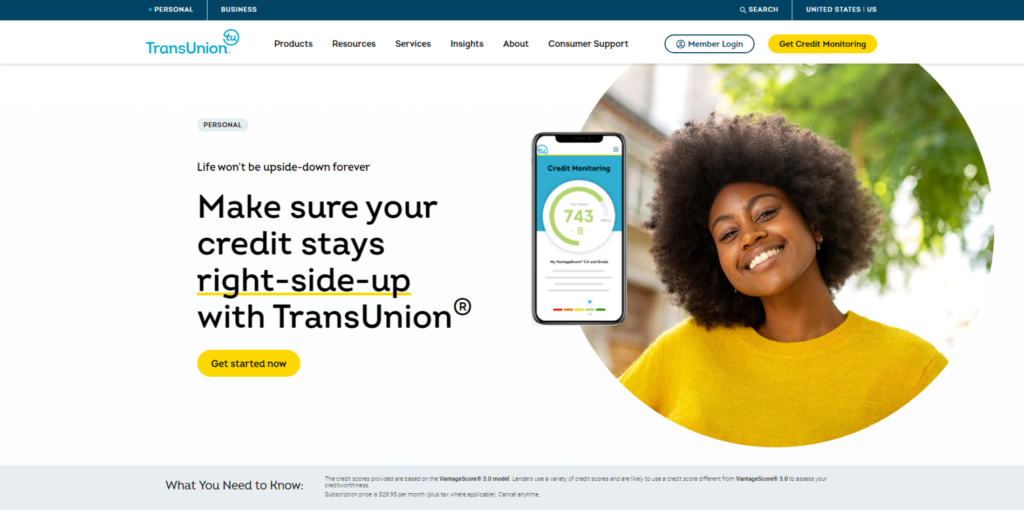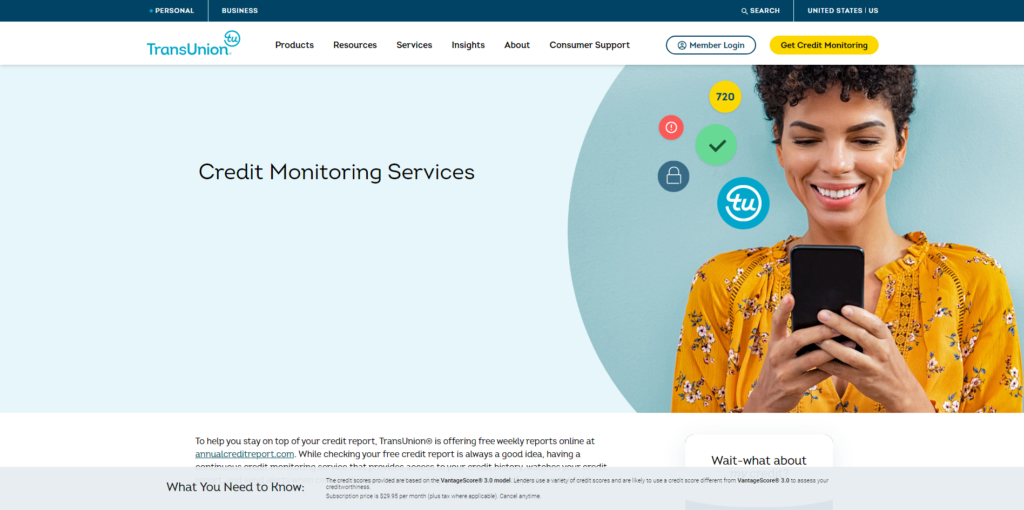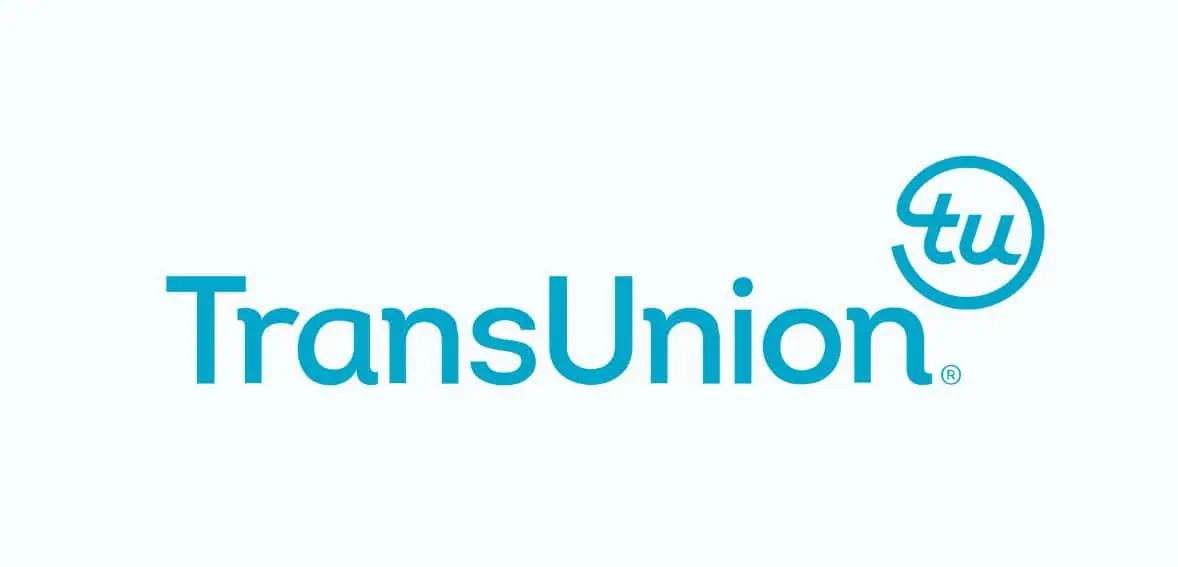The TransUnion credit score & report are crucial factors in determining your financial future. Although TransUnion does not evaluate businesses at present, your personal credit score can still significantly affect your company’s operations, especially if your business has yet to establish its own credit score.
In America, there are three major credit reporting agencies – Equifax, Experian, and TransUnion. With three separate reports to keep track of, monitoring your credit can seem daunting. Still, it is essential if you wish to improve your credit score and take advantage of the exclusive benefits of a high credit rating.
This guide will dive into the intricacies of TransUnion, including its credit scoring system, the advantages of credit monitoring, and a range of related subjects. Let’s embark on this educational journey.
What is TransUnion?
TransUnion is one of the three major credit reporting agencies in the United States, along with Equifax and Experian. The company provides credit reporting services to individuals, lenders, and other organizations.
The primary purpose of TransUnion is to gather, store, and analyze credit-related information on individuals and businesses. This information is then used to generate credit reports, which provide an overview of an individual’s or business’s credit history and creditworthiness.
The credit reports generated by TransUnion are used by lenders, landlords, insurance companies, and other organizations to make informed decisions about granting credit, loans, or insurance.
What is a TransUnion Credit Report?

A TransUnion credit report is a detailed summary of an individual’s or business’ credit history. It includes information on credit accounts, payment history, debt levels, and other financial behaviors that help lenders, insurance companies, and other organizations assess the creditworthiness of an individual or business.
A TransUnion credit report includes information such as:
- Personal information: name, address, Social Security number, and date of birth
- Credit accounts: credit cards, loans, and mortgages, including account balances and payment history
- Public records: bankruptcies, foreclosures, and tax liens
- Credit inquiries: a record of every time a lender or other organization accessed your credit report
- Collections: any collections or charged-off accounts that have been reported to the credit bureau
A TransUnion credit report is an essential tool for individuals and businesses to monitor their financial standing and ensure that their credit information is accurate. By regularly checking their credit reports, individuals and businesses can detect and dispute errors and take steps to improve their credit scores if necessary.
TransUnion offers various credit monitoring and identity theft protection services to help individuals and businesses stay informed about changes to their credit information and protect themselves from identity theft.
What is a TransUnion Credit Score, and What is Considered a Good Score?
A TransUnion credit score is a numerical representation of an individual’s creditworthiness. It is based on the information in their TransUnion credit report and calculated using a proprietary algorithm. The credit score’s purpose is to help lenders, insurance companies, and other organizations quickly assess an individual’s credit risk so they can make informed decisions about granting credit, loans, or insurance.
A good TransUnion credit score can range between 700 and 750. However, the actual definition of an “excellent” score varies based on the credit type or the lender. A score in the 700s and above is generally considered good, while a score below 600 is considered poor.
It’s important to keep in mind that credit scores can vary among the three major credit reporting agencies (TransUnion, Equifax, and Experian), so it’s a good idea to check all three of your credit reports and scores regularly to get a complete picture of your credit standing.
Various factors, including payment history, credit utilization, length of credit history, and more, can influence a credit score. By monitoring your credit score and taking steps to improve your credit, you can increase your chances of getting approved for credit products and loans with favorable terms and interest rates.
TransUnion Pros and Cons

Image source
Pros
Accurate and Up-to-date Information – TransUnion is one of the three major credit reporting agencies in the United States. It is known for providing accurate and up-to-date information to its clients.
Credit Monitoring – TransUnion offers credit monitoring services to help individuals and businesses stay informed about changes to their credit information so they can take proactive steps to improve their credit scores or detect and dispute errors.
Identity Theft Protection – TransUnion provides identity theft protection services to help individuals and businesses detect and prevent identity theft.
Widely Accepted – TransUnion credit reports and scores are widely accepted by lenders, insurance companies, landlords, and other organizations, making it easier for individuals and businesses to obtain credit and loans.
Cons
Cost – Some of TransUnion’s services, such as credit monitoring and identity theft protection, can be expensive, particularly for individuals on a tight budget.
Error-Prone – Although TransUnion is known for providing accurate information, mistakes can still occur. If an individual finds an error on their TransUnion credit report, they may need to take time to dispute it.
Limited Access – TransUnion does not currently assess businesses, so business owners may need to obtain credit reports from other sources to get a complete picture of their credit standing.
Limited Credit Score Range – TransUnion uses a different credit scoring model than other credit reporting agencies, and its scores can sometimes be lower than scores from other sources.
Ratings and Customer Reviews
TransUnion has received a mix of positive and negative customer reviews and ratings. Some customers have praised TransUnion’s accurate credit reporting and helpful credit monitoring services. In contrast, others have complained about errors on their credit reports, poor customer service, or high costs for certain services.
It’s important to keep in mind that individual experiences with TransUnion can vary greatly and that many negative reviews don’t necessarily mean that TransUnion is a poor choice for everyone. On the other hand, positive reviews should be taken with a grain of salt, as they may be biased or not representative of the typical experience.
Why Does TransUnion Matter to Individuals and Businesses?

TransUnion matters to individuals and businesses because it provides critical information about their credit history and creditworthiness.
TransUnion can help individuals monitor their credit information, detect and dispute errors, and take steps to improve their credit scores. A good credit score can open the door to better loan and credit card rates, lower insurance premiums, and more favorable rental terms, among other benefits.
TransUnion can help businesses monitor their financial standing, assess their creditworthiness, and make informed decisions about whether to extend credit or offer favorable loan or lease terms. TransUnion can also help businesses detect and prevent fraud and other financial crimes.
Overall, TransUnion is vital for individuals and businesses to stay informed about their credit information and take control of their financial futures. By regularly monitoring their credit reports and scores, individuals and companies can ensure that their credit information is accurate, take steps to improve their credit scores and make informed financial decisions to help them achieve their goals.
Conclusion
The TransUnion credit report plays a vital role in shaping an individual’s financial future. As one of the three major credit reporting agencies in the United States, TransUnion provides credit reporting services to individuals and organizations, offering a comprehensive overview of an individual’s or business’s credit history and creditworthiness.
Their credit report includes personal information, credit accounts, public records, credit inquiries, and collections, making it an essential tool for monitoring financial standing and ensuring accuracy. The TransUnion credit score, calculated using a proprietary algorithm, is used to assess an individual’s credit risk by lenders, insurance companies, and other organizations.
The score ranges from poor to good, with a score in the 700s and above considered good. TransUnion offers credit monitoring and identity theft protection services, but some of its services can be expensive and prone to errors. Despite these limitations, TransUnion remains a widely accepted source of credit reporting and scores, as shown by its mixed customer reviews and ratings.

